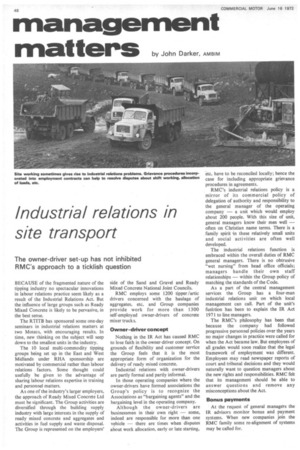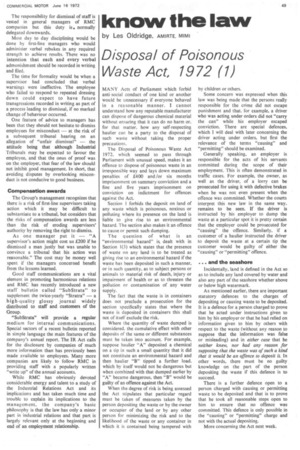Industrial relations in site transport
Page 50

Page 51

If you've noticed an error in this article please click here to report it so we can fix it.
The owner-driver set-up has not inhibited RMC's approach to a ticklish question
BECAUSE of the fragmented nature of the tipping industry no spectacular innovations in labour relations practice seem likely as a result of the Industrial Relations Act. But the influence of large groups such as Ready Mixed Concrete is likely to be pervasive, in the best sense.
The RTITB has sponsored some one-day seminars in industrial relations matters at two Motecs, with encouraging results. In time, new thinking on the subject will seep down to the smallest units in the industry.
The 10 local multi-commodity tipping groups being set up in the East and West Midlands under RHA sponsorship are motivated by commercial rather than labour relations factors. Some thought could usefully be given to the advantage of sharing labour relations expertise in training and personnel matters.
As one of the industry's larger employers, the approach of Ready Mixed Concrete Ltd must be significant. The Group activities are diversified through the building supply industry with large interests in the supply of ready mixed concrete and aggregates and activities in fuel supply and waste disposal. The Group is represented on the employers' side of the Sand and Gravel and Ready Mixed Concrete National Joint Councils.
RMC employs some 1200 tipper /artic drivers concerned with the haulage of aggregates, etc, and Group companies provide work for more than 1300 self-employed owner-drivers of concrete mixer trucks.
Owner-driver concept
Nothing in the IR Act has caused RMC to lose faith in the owner-driver concept. On grounds of flexibility and customer service the Group feels that it is the most appropriate form of organization for the delivery of ready mixed concrete.
Industrial relations with owner-drivers are partly formal and partly informal.
In those operating companies where the owner-drivers have formed associations the Group's policy is to recognize the Associations as "bargaining agents" and the bargaining level in the operating company.
Although the owner-drivers are businessmen in their own right -some, indeed are responsible for more than one vehicle — there are times when disputes about work allocation, early or late starting,
-etc, have to be reconciled locally; hence the case for including appropriate grievance procedures in agreements.
RMC's industrial relations policy is a mirror of its commercial policy of delegation of authority and responsibility to the general manager of the operating company — a unit which would employ about 200 people. With this size of unit, general managers know their men well — often on Christian name terms. There is a family spirit in these relatively small units and social activities are often well developed.
The industrial relations function is embraced within the overall duties of RMC general managers. There is no obtrusive "wet nursing" from head office officials; managers handle their own staff relationships — within the Group policy of matching the standards of the Code.
As a part of the central management services the Group has a four-man industrial relations unit on which local management can call. Part of the unit's futiction has been to explain the IR Act 1971 to line managers.
The RMC's philosophy has been that because the company had followed progressive personnel policies over the years no major changes in practiCe were called for when the Act became law. But employees of all .grades would soon realize that the legal framework of employment was different. Employees may read newspaper reports of court and tribunal decisions and they would naturally want to question managers about the new rights and responsibilities. RMC felt that its management should be able to answer questions and remove any misconceptions about the Act.
Bonus payments At the request of general managers the IR advisors monitor bonus and payment systems. When new companies join the RMC family some re-alignment of systems may be called for. The responsibility for dismissal of staff is vested in general managers of RMC companies but this duty is. normally delegated downwards.
Most day to day disciplining would be done by first-line managers who would administer verbal rebukes in any required strength to achieve results. There was no intention that each and every verbal admonishment should be recorded in writing and filed.
The time for formality would be when a supervisor had concluded that verbal warnings were ineffective. The employee who failed to respond to repeated dressing down could expect to have future transgressions recorded in writing as part of a process leading to dismissal, if no marked change of behaviour occurred.
One feature of advice to managers has been that they should not hesitate to dismiss employees for misconduct — at the risk of a subsequent tribunal hearing on an allegation of "unfair dismissal" — the attitude being that although Industrial Tribunals may be expected to favour the employee, and that the onus of proof was on the employer, that fear of the law should not inhibit good management. In short, that avoiding disputes by overlooking misconduct is not conducive to good business.
Compensation awards The Group's management recognizes that there is a risk of first-line supervisors taking action which it may be difficult to substantiate to a tribunal, but considers that the risks of compensation awards are less than the risk of eroding supervisors' authority by removing the right to dismiss.
As one manager put it — "A supervisor's action might cost us £200 if he dismissed a man justly but was unable to convince a tribunal that his action was reasonable." The cost may be money well spent if the managers concerned benefit from the lessons learned.
Good staff communications are a vital element in promoting harmonious relations and RMC has recently introduced a new staff bulletin called "SubStrata" to supplement the twice-yearly "Stratra" — a high-quality glossy journal widely distributed to staff and customers of the Group.
"SubStrata" will provide a regular medium for internal communications. Special sectors of a recent bulletin reported in simple language the main features of the company's annual report. The IR Act calls for the disclosure by companies of much more information than has previously been made available to employees. Many more companies are likely to follow RMC in providing staff with a popularly written "write up" of the annual accounts.
While RMC has obviously devoted considerable energy and talent to a study of the Industrial Relations Act and its implications and has taken much time and trouble to explain its implications to the management, the company's basic philosophy is that the law has only a minor part in industrial relations and that part is largely relevant only at the beginning and end of an employment relationship.




























































































